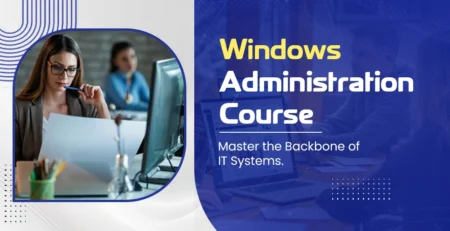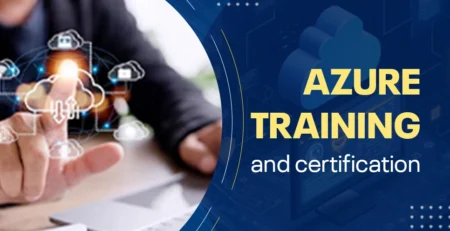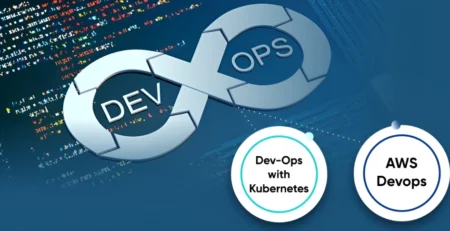Successful Career Path After Finishing the DevOps Training in Delhi
If you are worried about what your career will be after completing DevOps training in Delhi, this is the right blog you are reading. After completing DevOps training, your career opportunities become quite bright. Furthermore, tech companies and startups here actively hire professionals who understand both development and operations, including those with a DevOps mindset. Likewise, after the DevOps course in Delhi, you can start your DevOps career in roles such as DevOps Engineer, Cloud Engineer, Automation Engineer, or Release Engineer. Additionally, these roles require proficiency in tools such as Git, Jenkins, Docker, Kubernetes, and cloud platforms (such as AWS, Azure, and GCP).
Nevertheless, demand for DevOps profiles in metro cities like Delhi, Mumbai, and Bangalore is high, so the scope for both growth and salary remains strong. If you continue learning, earn certifications, and work on real-time projects, you can easily advance to senior positions like DevOps Architect or Site Reliability Engineer (SRE). Consequently, completing DevOps training in Delhi is not just about finishing a course. Therefore, an advanced DevOps course in Delhi is a solid start to a strong, future-ready IT career.
What is Exactly DevOps?
DevOps is an approach that brings together development (creating software) and operations (running and maintaining software). Likewise, its primary goal is to improve teamwork and collaboration, enabling software to be delivered quickly and reliably. In the traditional model, developers wrote code, and the operations team deployed it. However, communication gaps between the two led to delays and issues. DevOps addresses these problems through practices such as automation, continuous integration, and continuous delivery.
Moreover, the primary focus of DevOps is on increasing speed, accuracy, and efficiency. At the same time, this model uses tools such as Jenkins, Docker, Kubernetes, and Git to streamline the process. When teams adopt a DevOps culture, they receive quick feedback, and errors are fixed quickly. For the company, a DevOps course in Delhi means individuals can deliver better performance, faster updates, and satisfied customers.
Ultimately, DevOps is a mindset based on “Build fast, deliver faster.” It brings both technical and cultural change. In today’s digital age, DevOps training in Delhi has become a mandatory approach for every competitive organization.
Some imperative principles of DevOps that every individual will learn after their advanced DevOps course in Delhi:
1. Automation
It includes repetitive tasks, such as integration, testing, and deployment.
2. Continuous Integration and Continuous Deployment (CI/CD)
Without affecting the system, CI/CD ensures regular code deployments and integrations.
3. Monitoring
It is used in the software lifecycle to detect and fix fundamental issues before they become significant issues.
4. Collaboration
In this category, all developers and operations teams work together to enhance the software development lifecycle.
The Rising Demand for DevOps Training in the Real World
Several individuals working in technical or information technology roles after completing their DevOps training in Delhi are aware that DevOps enhances software development and deployment in organizations by preventing conflicts between development and operations teams. Nonetheless, it has been one of the main challenges businesses have faced for a long time.
Organizations that implement DevOps principles can deliver more in less time. Moreover, the practical implementation of a DevOps methodology enables firms to provide software solutions more quickly. Likewise, when a company uses DevOps with professionals who have completed their DevOps training at the best DevOps training institute in Delhi, the development team (which writes code) and the operations team (which manages servers, deployments, etc.) work together. Additionally, it allows for faster detection and resolution of problems in production. It has a direct effect on customers’ experience, their feedback is easier to handle, and the company can communicate more clearly.
Furthermore, companies that use professionals from the DevOps course in Delhi have several technical benefits.
- Larger issues are broken down into smaller components, allowing them to be handled more quickly. Furthermore, when work is done in smaller pieces, it’s easier to debug, test, and fix.
- Software distribution becomes continuous and integrated, representing new versions and updates that reach users regularly and smoothly, without significant downtime.
- The benefit is the increased release rate of new software features. Earlier, features were released infrequently or after long delays.
- Operations environments (dev, test, staging, and production) become more consistent, reducing the number of “I was running on my system” type issues.
- Teams have more time to deliver real value because repetitive tasks are automated.
So, it’s not surprising that organizations want candidate who have completed their DevOps course in Delhi and know how to use DevOps tools and practices in the company projects. Furthermore, their main goal is to continuously integrate and deliver software to stay fast in the market to provide better service to customers. Hence, competition is so intense these days that if you slow down, another company will overtake you. DevOps gives them both this speed and reliability.
As more companies highlight DevOps, demand for experts who have completed their DevOps training in Delhi is also increasing. Businesses want people who can handle DevOps tools, automation, CI/CD pipelines, monitoring, etc. As a result, DevOps roles are growing in the job market. The passage notes that DevOps job postings on leading job portals (such as Indeed) have increased by approximately 75%, and that the rate of DevOps mentions on social networks like LinkedIn has increased by 50%. These numbers show the demand for this field.
The primary role of DevOps engineers after completing their DevOps training in Delhi is to increase productivity through automation. However, it means automating manual tasks (such as repeatedly running the same commands, performing manual deployments, and conducting manual testing) using scripts, tools, and pipelines. Furthermore, companies that fully consider a DevOps mindset can deploy software approximately 30 times faster than their competitors. Consequently, this speed enables them to respond quickly to market changes, fix bugs, and iterate on new features.
Earlier, people thought that “DevOps” was just a short-term trend. However, now it has become a serious methodology for building and managing software. It is not known as just a set of tools, but a mix of technology, process, and mindset. In today’s fast-changing technological world, the importance and role of DevOps training in Delhi are both high. In simple terms, DevOps will remain an essential part of the future, so if you want to enter the IT/software field, completing your studies from the best DevOps training institute in Delhi will be very useful.
How to Prepare for Certification of DevOps Training in Delhi?
If you want to ace in DevOps training in Delhi to get a valid certification, start with foundational skills, such as Linux and programming, systematically study the exam guide and practice questions, and gain hands-on experience with cloud platforms and tools through labs. Additionally, you can use the resources of the DevOps course in Delhi to create a study schedule that includes practice and daily review, and take several practical exams to test your knowledge and get used to the exam format. However, here are some key points that give you a clear understanding of why you should complete your certifications.
- Build a Strong Foundation
- Get Hands-On With Cloud Platforms and Tools
- Study for the Specific Exam
- Practice, Review, and Revise
- Take the Exam
List of DevOps Career Paths After Finishing Your Course
Completing a DevOps training in Delhi provides a strong foundation for a wide range of career paths across the global technology industry. Additionally, these career roles are highly sought after and concentrate on streamlining, automating, and enhancing the security and reliability of the software delivery lifecycle. However, we have listed some known professional careers individuals can pursue after completing their course.
- DevOps Engineer
- Site Reliability Engineer (SRE)
- Cloud Engineer
- Automation Engineer
- Release Manager
- Infrastructure as Code (IaC) Specialist
- Security Engineer (DevSecOps)
- Containerization & Orchestration Specialist
- Monitoring & Performance Engineer
- Platform Engineer
Complete DevOps Syllabus Offered by Rexton IT Solutions
| Module | Topics Covered | Hands-On / Labs / Projects | Duration (Approx.) |
| 1. Introduction to DevOps | Definition & history of DevOps, Dev vs Ops, DevOps lifecycle & principles, Benefits, Roles & responsibilities, Key DevOps tools overview | Case studies, discussion of real-world DevOps in organizations | 1-2 days |
| 2. Version Control | Git basics, repositories, branching/merging, workflows (GitFlow, etc.), remote repositories (GitHub / GitLab) | Create sample projects, push/pull code, and resolve merge conflicts | 2 days |
| 3. Build Automation & CI / CD | Build tools (Maven / Gradle), setting up Continuous Integration, Jenkins (installation, jobs, pipelines), integrating build tools, and artifacts management | Build and test a simple application, set up a CI pipeline, and trigger builds via code commit | 3-4 days |
| 4. Containerization | Docker: architecture, images, containers, networking, Dockerfiles, Docker Compose, and container registries | Containerize an application, push image to registry, run with Docker Compose | 2-3 days |
| 5. Orchestration | Kubernetes basics, components (pods, services, deployments), configuring Kubernetes clusters, maybe AWS EKS / Azure AKS, etc. | Deploy a multi-container app on Kubernetes, scaling, service discovery, and Helm charts if included | 3 days |
| 6. Infrastructure as Code (IaC) | Concepts of IaC, Terraform (state, project structure, writing & applying scripts), AWS CloudFormation / ARM Templates, etc. | Write Terraform files, deploy infrastructure, maybe manage environments (dev/prod) | 2-3 days |
| 7. Configuration Management | Tools like Ansible / Puppet / Chef, basics of managing configuration, automating provisioning, roles/inventory, best practices | Provision servers, use playbooks to deploy & configure apps, manage updates via Ansible, etc. | 2 days |
| 8. Monitoring, Logging, Feedback & Observability | Monitoring tools (CloudWatch / Prometheus / Grafana, etc.), logging stacks (ELK, etc.), dashboards, alerts, feedback loops, performance & application monitoring | Set up monitoring dashboards, log aggregation, alert rules, simulate failures & observe responses | 2 days |
| 9. Security in DevOps (DevSecOps) | Integrating security into pipelines, secrets management (Vault, AWS Secrets Manager, etc.), scanning (static/dynamic), compliance controls, RBAC, etc. | Add security scans to the CI/CD pipeline, set up a secrets store, implement least privilege access, etc. | 1-2 days |
| 10. Cloud Platforms & Deployment Environments | Overview of AWS, Azure, GCP, using cloud services for compute, storage, networking, deploying apps in cloud, hybrid setups, etc. | Launch VMs, set up load balancers, deploy sample app, manage environment via IaC | 2-3 days |
| 11. Real-World Projects / Capstone | End-to-End pipeline: code → build → test → containerize → deploy → monitor, microservices / serverless if included, integration of multiple tools. | Capstone project involving several of the above tools, presentation, and review | 4-5 days |
| 12. Certification & Interview Preparation | Overview of relevant certifications (AWS, Azure, Docker, Kubernetes, etc.), exam guidance, mock tests, resume & interview prep | Mock interviews, solving sample certification questions, and feedback sessions | 1-2 days |
It’s Time to Wrap Things Up!
Building a successful career in DevOps after completing DevOps training in Delhi requires commitment, continuous learning, and hands-on experience with the right tools and practices. Furthermore, begin with a solid foundation in best practices, task automation, and cloud platforms. Moreover, it’s time to enroll in a reputable DevOps certification program to boost your skills and career goals.
However, if you are searching for the best institute for DevOps training in Delhi, look no further than Rexton IT Solutions. Furthermore, we have a comprehensive team of professionals here to guide you at every step of your course. Nonetheless, whether you are stuck on any topic or want to clear your doubts, our professionals ensure you receive in-depth knowledge that will stay with you forever. So, do not wait any longer. Sign up with us and start your DevOps journey today!











